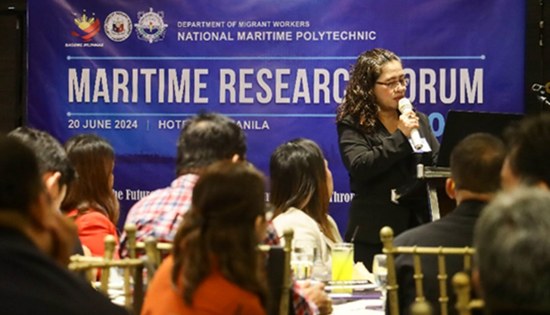Challenges and
opportunities in embracing Distance Learning: Insights from NMP
study
|

Ms.
Zenaida Eugenia D. Palita, presenting the research findings
on Investments on Distance Learning in Philippine Maritime
Training Institutions during the DMW-NMP Maritime Research
Forum on June 20, 2024 at Hotel H2O, Manila. |
Press Release
June 27, 2024
TACLOBAN CITY – In
response to the accelerating digital transformation within the
maritime industry, the National Maritime Polytechnic (NMP) conducted
a research study on the Investments on Distance Learning in
Philippine Maritime Training Institutions (MTIs) in CY 2023.
Findings of the study
unveiled that among the 87 surveyed Maritime Industry Authority
(MARINA)- accredited MTIs, 49% (43 MTIs) have incorporated distance
learning into their programs, with 39 providing responses. These
institutions made substantial investments in manpower, technology,
and infrastructure to comply with MARINA Advisory No. 2020-59. This
included hiring trainers, IT staff, and administrative support, as
well as upgrading of information and communications technology (ICT)
infrastructure like Learning Management Systems (LMS), internet
connectivity, and training facilities.
Manpower resources were a
crucial focus, with varying compensation schemes and a need for
additional training among instructors and assessors to effectively
deliver online training. Most MTIs relied on existing staff or
trainers to transition training materials to online formats, with
limited involvement of external subject matter experts (SMEs). MTIs
primarily utilized cloud-based LMS like Google Classroom and Zoom,
though stability of internet connectivity remained a concern,
addressed predominantly by increasing bandwidth rather than
acquiring new connections.
Financial constraints
emerged as a major barrier, alongside preferences among instructors
for traditional face-to-face teaching methods and the challenge of
meeting MARINA's stringent compliance requirements for online
training accreditation.
These concerns were echoed
by MTIs that have yet to adopt distance learning, who also cited
inadequate internet infrastructure as a significant obstacle.
Post-pandemic, some MTIs
reported reduced demand for distance learning, attributing it to
improved health conditions and the preference for in-person
training.
These findings underscore
the need for targeted support and streamlined regulations to
facilitate broader adoption of distance learning among Philippine
MTIs, ensuring they can effectively integrate digital solutions into
maritime education and training to meet evolving industry demands.
The study recommends
significant actions for the Philippine government, including
upgrading of ICT infrastructure and providing high-volume,
high-speed internet access, particularly in underserved areas and
public institutions. Legislative measures are urged to ensure
reliable internet and power supply across the country, crucial for
seamless online education. Furthermore, partnerships and agreements
with telecom companies are encouraged to provide stable connectivity
and support IT infrastructure development.
Government subsidies,
funds, and scholarships are proposed to support MTI personnel and
seafarers participating in distance learning, alongside policy
support, research, and regular evaluation of online education
initiatives. Public awareness campaigns are also recommended to
promote the benefits of distance learning in maritime education.
It was also recommended to
MARINA to simplify accreditation processes with clear guidelines and
standardized training standards applicable to all MTIs in terms of
STCW mandatory training courses. Flexibility in regulatory
frameworks is advised to expedite the adoption of distance learning
methods. The establishment of specialized training centers and the
standardization of software used in distance learning are emphasized
to ensure consistency and quality across institutions.
The study advocates for
further research into the advantages and challenges of online
training within Philippine maritime education, aiming to
continuously refine educational practices. These recommendations aim
to create an enabling environment for advancing distance learning in
Philippine MTIs, aligning education with industry demands and global
trends.